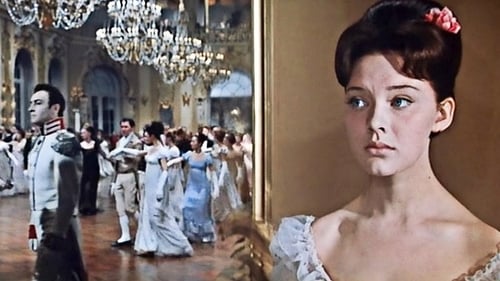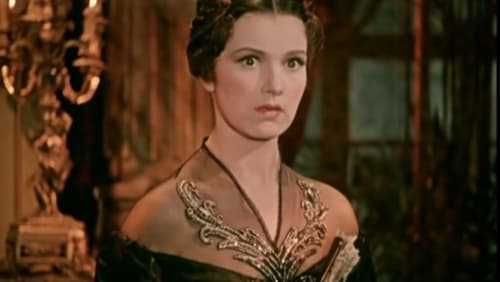
Drubetskaya
첫 번째 이야기에 이어 ‘2부- 나타샤 로스토바 Natasha Rostova’ 편에서는 역사의 소용돌이 속에 있는 러시아의 젊은 귀족 안드레이, 그의 친구 피에르와 백작의 딸 나타샤의 삶과 사랑 이야기가 펼쳐진다.

Drubetskaya
서자인 삐에르는 부친의 죽음 이후 거액의 재산을 상속받게 된다. 그 후 애정이 없었던 삐에르와 엘렌의 결혼 생활은 엘렌의 방탕한 생활로 별거에 이르게 된다. 한편 구사일생으로 아버지인 볼콘스키 공작에게로 돌아온 안드레이에게는 아내 리차의 죽음이라는 또 다른 시련이 다가온다. 그러던 중, 삐에르와 안드레이는 오랫만에 재회해 마음의 상처를 달랜다.
안드레이는 성숙한 여인이 된 나타나에게 매료 당하고 마침내 결혼을 신청하기에 이른다. 그러나 안드레이가 전쟁터로 떠나자 나타샤는 불안과 초조 속에서 방황하다가 결혼 약속을 취소해 버린다. 그러한 사실을 알 리가 없는 안드레이는 전장에서 자신의 모든 것을 걸고 조국애를 발휘하는데...

Drubetskaya
러시아의 젊은 귀족 안드레이는 아내의 반대를 무릎쓰고 군에 자원했다가 중상을 당한다. 그의 친구 피에르는 재산을 탐하여 시집을 온 엘렌과의 불화로 별거에 이른다. 구사일생으로 돌아온 후 아내의 죽음으로 실의에 잠겨있던 안드레이는 백작의 딸 나타샤에게 매료당하여 청혼을 하게 된다. 나폴레옹군의 전진으로 위기에 몰린 러시아를 구하기위해 안드레이와 피에르는 전장에 뛰어든다. 폐허화되었던 모스크바는 전력을 빼앗긴 나폴레옹군을 역습하여 마침내 승리를 거둔다. 모스크바로 돌아온 삐에로는 안드레이를 잃은 슬픔에 빠진 나타샤를 위로하다 그녀와 사랑이 싹트게 된다.

Semenikha
Based on the novel of the same name by Leonid Leonov. Young Polya comes to Moscow: she wants to find her father, Professor Vikhrov, and try to understand why her mother broke up with him. Vikhrov is a prominent scientist who has defended the forest from barbaric destruction all his life. The war begins. Professor Vikhrov continues to lecture, proving to students the need to protect the forest. Polya is trying to find out the reasons for the long-standing feud between her father and academician Gratsianskiy. Now, when Vikhrov is already not young and lonely, the professor mentally returns to the past...

Rodka Gulyaev is a pupil of the Gumniskii rural secondary school. He on the bank of the river digs out the darkened old icon, and his grandmother Avdotya, an overbearing and cunning old woman, dissolves a rumor that the icon is miraculous, and her granddaughter is a saint.

Anfisa
Pilot Losev, who lost his family during the war, learns that his daughter Aurika was saved during the bombing, and sets off in search of her. The former pilot will survive many fates and stories before a familiar chorus of a lullaby helps him to recognize his daughter in a random fellow traveler.

Nina Aleksandrovna Ivolgina
The film is based on the first part of the novel of the same name by Fyodor Dostoevsky.
Prince Myshkin returns to Russia from Switzerland, where he was treated in a psychiatric clinic. On the train, on the way to St.Petersburg, the prince meets Parfyon Rogozhin, who tells him of his passionate love for Nastasya Filippovna, the former containment woman of the millionaire Totsky. In St.Petersburg, the prince finds himself in the house of his distant relative – Lizaveta Yepanchina (General's wife), meets her husband, their daughters, as well as the Secretary of General – Ganya Ivolgin. The portrait of Nastasya Filippovna, accidentally seen on the general’s table, makes a great impression on the prince...

Luisa Karlovna Ivanova

Working with children led Barskaya to create superb direct sound and an inspired style of shooting. Don’t look for conventional cinematic syntax here. The film is chaotic in the way that Soviet films still knew how to be, and Langlois couldn’t help but be seduced by its rebellious spirit, its anarchy and love of children, comparable to Vigo’s Zero de conduite.
As well as being a film made with and for children, it offers a complex take on Western society. Pre-Nazi Germany is not named as such but is carefully reconstructed, possibly under advice from Karl Radek, and children offer a playful reflection of class struggle – doubly excluded, as proletarians and as minors. “They play in the same way that they live”, one intertitle says. The interaction between their comical games and the yet more ludicrous ones played by adults is developed on several levels.







